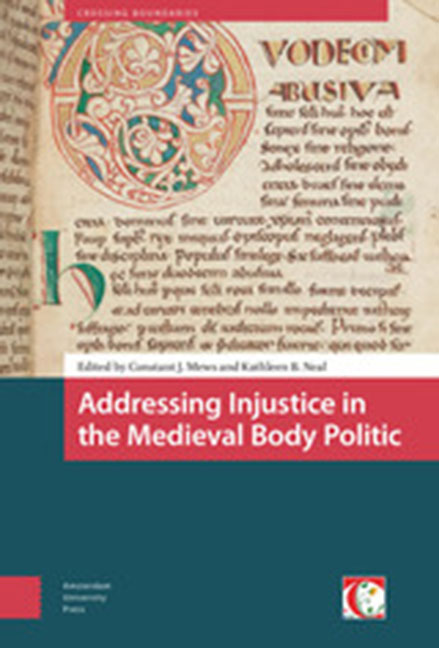Book contents
- Frontmatter
- Contents
- Acknowledgements
- Abbreviations
- Note on References
- List of Tables and Illustrations
- Introduction: Justice and its Abuse in the Medieval Body Politic
- 1 The De XII abusiuis saeculi: Contexts and Textual Traditions
- 2 The Irish Background to the De XII abusiuis saeculi
- 3 ‘Each in the Calling to Which They are Called’: Images of Authority in the De XII abusiuis saeculi
- 4 Transforming Irish Traditions: De XII abusiuis saeculi and Justice in the Frankish World, c. 750–1050
- 5 The Unjust King and the Negligent Bishop: Addressing Injustice in Eleventh and Twelfth-Century England and Germany
- 6 Reflecting on Abuses in Religious Life: From The Twelve Abuses of the Cloister to The Cloister of the Soul
- 7 Preaching the Body Politic: John of Wales and Franciscan Political Thought in the Late Thirteenth Century
- 8 Justice and Its Abuses in the Speculum justiciariorum
- 9 Addressing Abuses and Injustice in the Court of Philip the Fair: The De informatione principum of Durand of Champagne
- 10 ‘Perfect Justice Weighs Everything on a Balanced Scale’: Italian Friars on Equity, the Common Good, and the Commune c. 1270–c. 1310
- 11 Some Late Franciscan Rewritings of the Twelve Abuses
- Appendix: On the Twelve Abuses of the Age A Translation
- Bibliography
- Index of Biblical References
- Index of Manuscripts
- General Index
5 - The Unjust King and the Negligent Bishop: Addressing Injustice in Eleventh and Twelfth-Century England and Germany
Published online by Cambridge University Press: 14 February 2024
- Frontmatter
- Contents
- Acknowledgements
- Abbreviations
- Note on References
- List of Tables and Illustrations
- Introduction: Justice and its Abuse in the Medieval Body Politic
- 1 The De XII abusiuis saeculi: Contexts and Textual Traditions
- 2 The Irish Background to the De XII abusiuis saeculi
- 3 ‘Each in the Calling to Which They are Called’: Images of Authority in the De XII abusiuis saeculi
- 4 Transforming Irish Traditions: De XII abusiuis saeculi and Justice in the Frankish World, c. 750–1050
- 5 The Unjust King and the Negligent Bishop: Addressing Injustice in Eleventh and Twelfth-Century England and Germany
- 6 Reflecting on Abuses in Religious Life: From The Twelve Abuses of the Cloister to The Cloister of the Soul
- 7 Preaching the Body Politic: John of Wales and Franciscan Political Thought in the Late Thirteenth Century
- 8 Justice and Its Abuses in the Speculum justiciariorum
- 9 Addressing Abuses and Injustice in the Court of Philip the Fair: The De informatione principum of Durand of Champagne
- 10 ‘Perfect Justice Weighs Everything on a Balanced Scale’: Italian Friars on Equity, the Common Good, and the Commune c. 1270–c. 1310
- 11 Some Late Franciscan Rewritings of the Twelve Abuses
- Appendix: On the Twelve Abuses of the Age A Translation
- Bibliography
- Index of Biblical References
- Index of Manuscripts
- General Index
Summary
Abstract
The De XII abusiuis saeculi was a popular text in the twelfth century, cited by, among others, Adelard, Ivo of Chartres, Gratian, and the Corpus iuris canonici, and found within many manuscripts. The treatise is well represented in medieval library catalogues: several copies circulated in twelfth-century England and it was cited by opponents of Henry IV during the Investiture Contest. This chapter examines its influence on contemporary political debates in twelfth-century England and Germany, two realms (and a period), usually better known for the growth of royal government, and of the supposed separation of Church and State, than the persistence of early medieval, classical, and patristic ideas, embodied in the Abuses.
Keywords: Abuses, investiture conflict, kingship, Holy Roman Empire, Pope Gregory VII, Henry IV
The influence of the De XII abusiuis saeculi on ideas of royal and episcopal office in eleventh- and twelfth-century England and Germany has received surprisingly little attention. This has been the case in spite of the large number of manuscripts, surviving in both realms, and the efforts made by historians of earlier periods to establish the influence of the ninth abuse upon the political thought of both Carolingian Europe and pre-conquest England. In this chapter, my analysis of DDAS's influence proceeds in three stages. In the first section, I explore how certain phrases, some of them scriptural in origin, found in the ninth and tenth abuses (the rex iniquus and the episcopus neglegens respectively) appeared to resonate with eleventhand twelfth-century writers when they turned to the subject of royal and episcopal power, though not always in the sense found in DDAS. From the ninth abuse, I examine the formulation of the scriptural injunctions to protect strangers, orphans, and widows (aduenis et pupillis et uiduis defensor esse) as well as to judge without respect of persons (sine acceptione personarum). The royal obligation to protect those vulnerable groups has been harnessed as a litmus test for the presence of DDAS's influence. As we will see, such an argument holds only limited justification. Turning to the tenth abuse, I explore the episcopal duty to correct sin and the circumstances in which that admonition should take place; both subjects raised by DDAS through its combination of two passages from the books of Ezekiel and Matthew. I also discuss the relevance of the fifth abuse (the femina sine pudicitia) to portrayals of royal and episcopal behaviour.
- Type
- Chapter
- Information
- Addressing Injustice in the Medieval Body Politic , pp. 141 - 172Publisher: Amsterdam University PressPrint publication year: 2023

